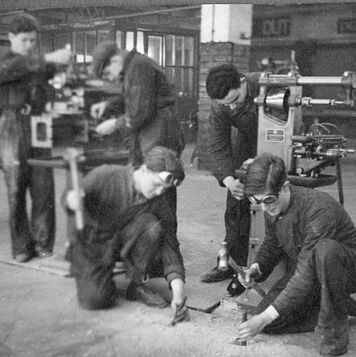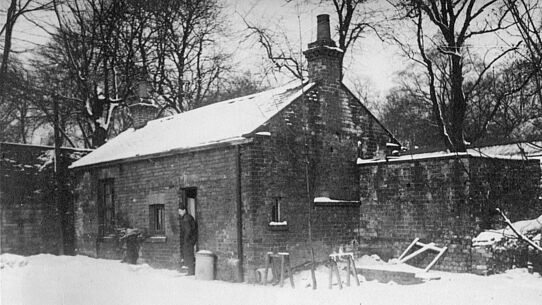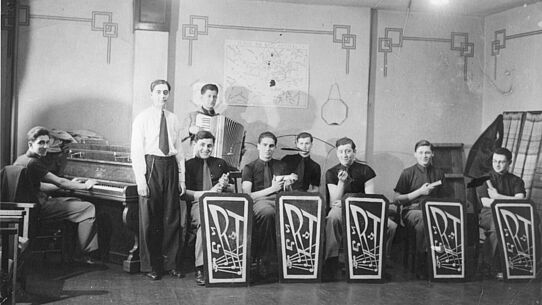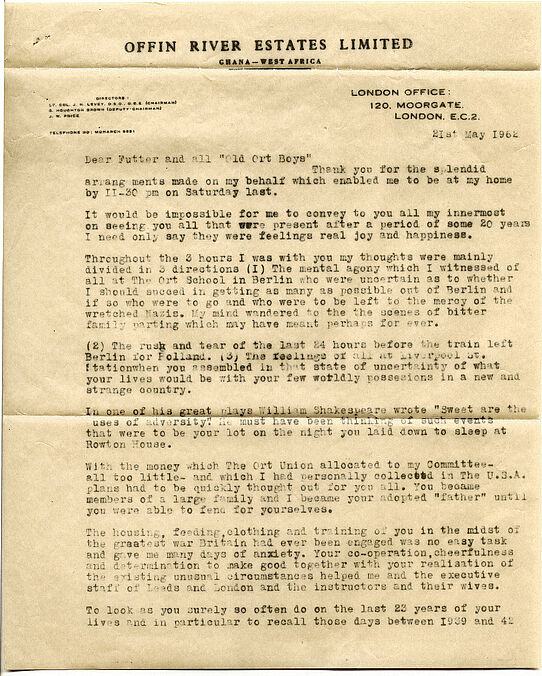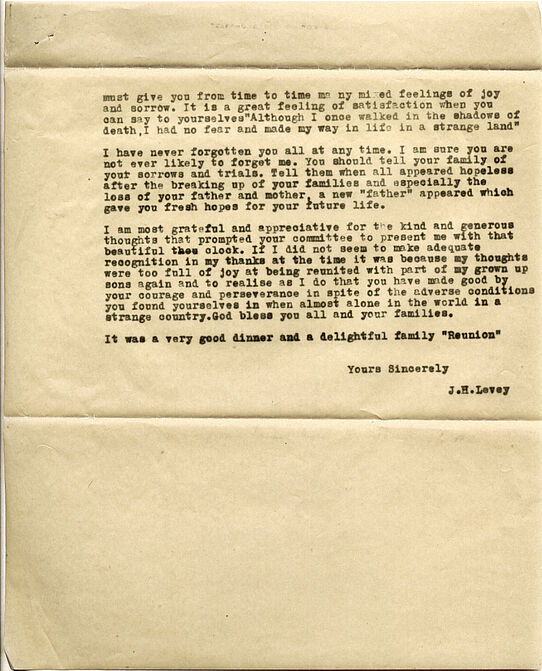The Berlin-Leeds ORT school, 1937-1943
In 1937 an ORT school was established in Berlin to provide technical education for Jewish boys excluded from state schools by the Nazis. Because of the increasingly precarious position of Jews in Nazi Germany, ownership of the school buildings and equipment was registered under British ORT (today’s ORT UK).
The main part of the school was divided into six departments: locksmiths, blacksmiths, plumbers, electricians, mechanics and welders. With so many Jewish professionals and academics being made unemployed by the Nazi regime, the school was able to attract the best in the field to serve as teachers. These included Professor Rupert, formerly Head of a State Technical Institute in Germany, Mr Friedrich Heilborn who, prior to the Nazis coming to power, had worked as an advisor of the State Patent Office, and Civ. Engineer Wiener, one of the chief engineers of the General Electric Corporation in Germany. The school’s board was headed by Civ. Eng. Behrend.
By July 1938, over 200 boys aged between 14-17 from all over northern Germany were studying at the school. The relationship between the Berlin school and British ORT, while not offering diplomatic protection, acted as a safety net during the November 1938 pogrom. The Nazis feared foreign intervention if they were to attack or destroy property belonging to another country, so they kept away from the Berlin school. According to a World ORT Union Report from 1939,
However, some parents were fearful of sending their kids to school following Kristallnacht. The only photographic record we have from the Berlin school was taken by Jewish photographer Lilli Szkolny in December 1938.
A former student who viewed this album in later years recalled that he and many of his school friends were missing from the photos because of this:
‘I remember very well I stayed away from the ORT school for about at least three weeks until things started to sort of 'normalise again' because my father had been taken away to a concentration camp and my mother was by herself. With only my help, we tried to carry on as well as we could under the circumstances.’
John Heller Comments on ORT Berlin Photo Album, 24 August 1999, p. 2. Archive Ref. d07a166
With the war fast approaching, British ORT arranged to transfer the school to England. The British Ministry of Labour and the Home Office both agreed to the move on the understanding that the school be set up in Leeds and that the equipment from Berlin be sent with the boys and staff. Unfortunately, the German authorities did not allow for the equipment to be exported, causing delays to the scheme. As time was running out and war seemed imminent, British ORT’s Lt. Col. Henry Levey persuaded the British government to allow the transfer without the equipment.
Former student Hans Futter later recalled the final days in Berlin before the move to England:
The first of a planned two ORT groups left Berlin in late August. A second group were due to depart in the following days but by then the war had started, sadly putting a stop to that option. Former student Henry Lippmann recalled the leave-taking at the station:
‘When, in August 1939, many of us said goodbye to our people we did not realise that we would never see them again ... I don't think any of us will ever forget the scene on the crowded platform of Bahnhof Charlottenburg, the journey to Cologne, the crossing of the border.’
H. Lippmann, unpublished memoir [Letter from an ORT refugee and Dunera internee in Australia], 1983, The Wiener Holocaust Library no: 4014, p. 1.
Over 100 students and several teachers arrived in England on 29 August 1939. They spent their first night in a hostel in the East End of London, then still a Jewish area. Hans Futter recalled the experience:
‘We had to pay one shilling for one night there. We were sitting there playing cards surrounded by all the drunks. … the following morning the news had got out that the boys from Berlin had arrived. Jewish women from the East End were outside crying as they knew we were the boys that had had to leave their parents and did not know anybody here. They gave us chocolate, sweets and sandwiches. They were relatively poor people who did not have much. They were very sweet to us and we were very taken aback by that.’
Hans Futter, interview with Sarah Kavanaugh, 12 March 2007.
The boys were initially sent to Kitchener Camp in Kent, a holding centre for refugees, while the school was being prepared and accommodation was arranged in Leeds. Once the school in Leeds was established it carried on the work and training that had begun in Berlin. It was divided into the same six categories: locksmiths, blacksmiths, plumbers, electricians, mechanics and welders.
The boys and teachers were housed in four hostels in the Chapeltown Road area in Leeds. The students helped furnish the rooms with hand-made wardrobes, tables and lamps. The school was run on a strict schedule with Colonel Levey imposing military discipline. The Leeds authorities were concerned that the local population would forget the ‘Jewishness’ of the refugees and see them only as German – and thus as the enemy. To mitigate this, a stringent set of rules were imposed upon the boys. The document, ‘Regulations of the Leeds ORT Technical and Engineering School’, laid out the rules to be followed. It opened by saying:
The first of the twenty-six rules demanded: ‘Never speak German in the streets, so that you can be heard. Try not to speak German at all if you can help it, and in any case speak very quietly.’

Student A. Lewinsky described the daily life of the Leeds boys in the first few months after arriving in Britain:
‘Though we are staying here only a short time, we have tried to equip our hostels as comfortably as possible. … In our dining-room adorned by self-drawn pictures we have our very nourishing meals, which are prepared by a skilled Refugee female cook in the kitchen. You can recognise our meal times by the delighted faces of 100 hungry lads who are strengthened to their new work by the good food. …That’s our new Jewish youth who are conquering oppression by their skillfull [sic] handwork.’
A Lewinsky, ‘Our New ORT Hostels in Leeds’, February 1940. Archive Ref. d07a155
Over time, other Jewish boys who originally came from Austria and Czechoslovakia, and who were living in hostels in England joined the ORT school in Leeds. Eventually there were 200 or so boys in training.
The school had an active social committee. The boys edited and wrote a regular school magazine (Mar, Apr, May-Jun, Jul, Aug 1941), demonstrating how well they had integrated into British society by writing it in perfect English and commenting on local and national events. They also organised a dramatic society which staged school plays, held sports tournaments, a chess club and had a student band.
As they graduated, in the midst of the war, some of the students joined the British army, some went into the war-effort workforce, while others were sadly interned as enemy aliens once they turned 18 years of age. While some immigrated to the USA, Australia and Israel, many remained in Leeds and other areas of the UK, making it their new home.
The school continued to operate until 1942. The “Old ORT Boys”, as they became known, kept in touch over the years and continued to meet and socialise at regular reunions. They also kept in close contact with their teacher and friend Max Abraham, who had travelled with them from Berlin. In their 1962 reunion they met up with Col. Levey who then wrote them the following moving letter:
In Berlin, what was left at the truncated school after the start of the war did not dissolve. The ORT school’s enrolment actually increased as other channels available to Jews virtually disappeared. Incredibly, it continued into the war and even beyond the July 1942 Nazi decision for the final extermination of European Jews.







